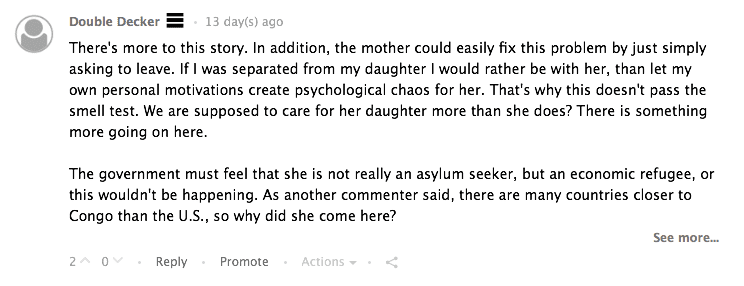I am so disheartened by where so much of the current conversation on immigration seems to be. I recently read an article about a seven-year-old Congolese girl in who is being held in a detention facility in Chicago thousands of miles from her mother, who is being detained in a separate facility in California. The pair came to the U.S. and immediately identified themselves as asylum seekers, and here is where they find themselves. They’ve been separated for months. The little girl is alone.
If I was shocked by what I read, I was horrified by the comments in the comment section. I know, I know—never read the comments. But I was curious how people were reacting to the story. And it turns out that many were reacting like this:

Text: “Asylum requires that the person is in grave danger in their home country. In that case, there are at least 60 countries closer to Congo than the U.S. in which she could have sought asylum. We’re not the dumping ground for the world’s problems…at least not anymore.”
In 1883, to raise money for the construction of the pedestal of the Statue of Liberty, American poet Emma Lazerus wrote a poem—The New Colossus. The poem was quickly associated with the project, and was added to the statue’s foundation in 1903.
Not like the brazen giant of Greek fame,
With conquering limbs astride from land to land;
Here at our sea-washed, sunset gates shall stand
A mighty woman with a torch, whose flame
Is the imprisoned lightning, and her name
Mother of Exiles. From her beacon-hand
Glows world-wide welcome; her mild eyes command
The air-bridged harbor that twin cities frame.
“Keep, ancient lands, your storied pomp!” cries she
With silent lips. “Give me your tired, your poor,
Your huddled masses yearning to breathe free,
The wretched refuse of your teeming shore.
Send these, the homeless, tempest-tost to me,
I lift my lamp beside the golden door!”
How far we have come from this sentiment.
Out of everything that has frustrated me about the directions our country has taken in the last few years, the rampant and open xenophobia in comments like the one above has upset me perhaps the most. Maybe that is because it is an upset of what I thought this country was fundamentally about. I grew up in a conservative evangelical family that had photos of Reagan on the wall—but you know what? I grew up hearing only positive things said about immigration.
Immigration was what had made this country strong, I was told. We are a nation of immigrants (that portrayal, of course, leaves out all Native Americans and most African Americans, which is a conversation we need to have). I grew up in a family where we talked about ancestry and genealogy. I knew where my ancestors came from. All of my grandparents were born in the U.S., but not all of their grandparents were. I have ancestors who came on the Mayflower, and everywhere in between.
Reagan, by the way, passed amnesty. I have a friend whose parents came to the U.S. without documents, before she was born, and gained legal status only when Reagan passed amnesty. Reagan made her parents legal. Would conservatives today recognize that Regan, I wonder?
I live in a diverse area. Immigrants come from everywhere. My children go to school with the children of immigrants from Mexico, Columbia, Guatemala, Brazil, Spain, Germany, Nigeria, Haiti, Jamaica, French Guiana, and more. I suppose that may be one reason the xenophobia gets to me—and one reason I fundamentally don’t understand it. I see immigrants and the children of immigrants every day, I live among them, I work among them. They’re all simply people just like you and me.

Text: “There’s more to this story. In addition, the mother could easily fix this problem by just simply asking to leave. If I was separated from my daughter I would rather be with her, than let my own personal motivations create psychological chaos for her. That’s why this doesn’t pass the smell test. We are supposed to care for her daughter more than she does? There is something more going on here. The government must feel that she is not really an asylum seeker, but an economic refugee, or this wouldn’t be happening. As another commenter said, there are many countries closer to Congo than the U.S., so why did she come here?
Because God forbid we accept an economic refugee—like my great-great-grandfather, who came here looking for work.
Do we want to be a country of closed doors? Or a country that offer some beacon of hope for those in bad situations around the world? There is so much about this country that we have done wrong—imperialist wars and international arms dealings, for starters—against all of that, could we at least do this one thing right? Is that really so hard?
I have a Patreon! Please support my writing!















